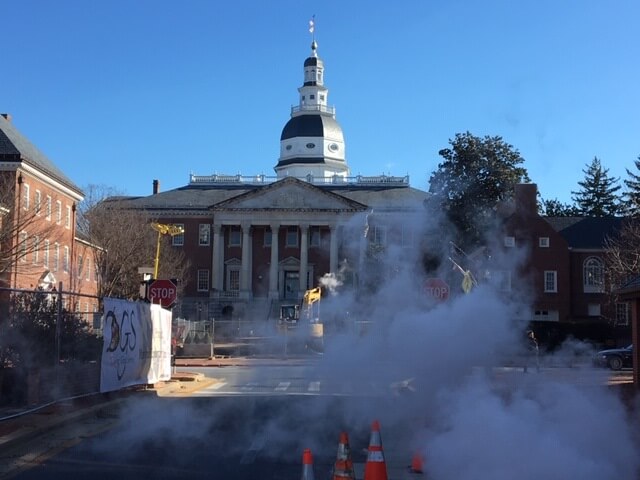One-Stop Shopping: A Roundup of Wednesday’s Major Developments

The Fight for Fifteen is likely headed to a conference committee.
The Senate gave preliminary approval Wednesday evening to Senate Bill 280, its version of a $15-an-hour minimum wage bill, which would exempt businesses with 15 employees or less of having to fully implement it until 2028.
The Senate debated amendments to the bill for almost an hour, but ultimately moved forward a version of the legislation crafted by the Finance Committee.
Sen. Mary Beth Carozza (R-Lower Shore) introduced an amendment that would slow the increase of the minimum wage overall and apply a 20 percent lower regional wage in parts of the state outside of Montgomery County, Prince George’s County, Howard County, Anne Arundel County, Baltimore County and Baltimore City.
“This mandated wage increase is not a sustainable increase for businesses of any size,” Carozza said, especially once Maryland is compared to nearby states.
Sen. Cory V. McCray (D-Baltimore City) said the legislation’s slow climb to $15 by 2025 decreases its effectiveness and opposed the regional amendment. He cited high rates of poverty in Western Maryland and the Eastern Shore, two areas that would be affected by Carozza’s amendment.
“I ask you, beg you, not to forget about those folks that need you the most,” McCray said.
Carozza’s amendment failed 18-29.
Sen. Justin Ready (R-Carroll) introduced an amendment that would require the state to move forward with a wage increase contingent on similar legislation being passed in District of Columbia, Delaware, Pennsylvania, Virginia, and West Virginia. The amendment was a nod to Democrats’ efforts to tie Maryland’s movement on nonpartisan redistricting to other states.
Recycling a Republican criticism of that bill, Sen. Finance Chair Delores Kelley (D-Baltimore County) said the amendment, “in a very mischievous way,” would ensure no movement.
Sen. Craig Zucker (D-Montgomery), who sponsored the multi-state redistricting efforts rose to speak against Ready’s amendment.
“Maryland is a leader in so many areas. Since when do we wait for five other states to pass legislation before enacting something that the vast majority of citizens want?” Zucker said.
The foil, of course, was that Zucker was reading a quote from Gov. Lawrence J. Hogan Jr. (R) about that redistricting bill.
“So, I’m worried if we adopt this, the governor will definitely veto it,” Zucker said. “…Maryland’s a leader and we should make sure that other states follow.”
The amendment failed 14-31.
Sen. Ronald N. Young (D-Frederick) introduced an amendment that remove the exemption for small businesses. He said making employees in small companies wait until 2028 to reach $15 “is just way too long to me.”
His amendment failed on a voice vote.
Sen. Katie Fry Hester (D-Carroll and Howard) unsuccessfully attempted an amendment that would apply the small business exemption to businesses with 25 or fewer employers.
Sen. Andrew Serafini (R-Washington) proposed an amendment to increase the wage to $12 and expand the state’s Earned Income Tax Credit. That amendment also failed on a voice vote.
The Senate also conformed the House Bill to the Senate version, which will likely send the measure to a conference committee to iron out differences, the main one being the delay for small businesses to fully implement the $15 wage.
McCray said he was confident Wednesday night that a compromise would be found between the two chambers and that the legislation would move to Hogan’s desk.
“I feel pretty confident we have the votes to override the veto, when and if it happens,” McCray said.
A final vote is expected this week.
Drivers license designations
The House of Delegates passed Senate Bill 196 from Montgomery County Sen. William C. Smith Jr. (D), which would allow residents to apply for licenses with gender identifiers of “M,” “F,” or “X.”
After a brief debate by Republican lawmakers who opposed the measure, the bill passed 89-49, becoming the eighth bill to pass both chambers this session.
School year
The House voted 95-45 to pass Senate Bill 128, which would overturn Hogan’s executive order requiring schools to start after Labor Day and end by June 15. Hogan has vowed to take the measure to a referendum. In response, the House of Delegates added an amendment to the Senate bill, setting the ballot language:
“This Act would allow a county board of education to set the start date and end date of the school calendar for the public schools in that county. Public schools must be open for at least 180 days and 1,080 school hours at elementary and middle schools and 1,170 hours at high schools during a 10-month period. A county board may apply to the State Board of Education for a waiver from these requirements if normal school attendance is prevented because of natural disaster, civil disaster, or severe weather conditions.
This Act would return to a county board the sole authority to set the start and end dates of the school calendar year. A county board would still be required to meet other requirements, such as the minimum number of days and hours, when setting the school calendar.”
Hogan’s office issued a statement responding to the vote on Wednesday afternoon: “This is just politics at its worst. As if it isn’t bad enough that members of the legislature are attempting to reverse our common sense initiative to start school after Labor Day, they are now using heavy-handed tactics to unfairly influence the ballot process and any petition to bring this issue directly to Maryland voters.”
The bill heads back to the Senate chamber for reconciliation.
Retiree benefits
The Senate voted 47-0 in favor of Senate Bill 946 to alter retiree prescription drug benefits. Advocates had sought restoration of the prior benefit program, but a compromise bill was crafted to cap out-of-pocket costs while lowering the state’s liability. Senate President Pro Tem Katherine A. Klausmeier (D-Baltimore County), who was the only member not listed a cosponsor of the bill, thanked Sen. Melony G. Griffith (D-Prince George’s) and Sen. Andrew Serafini (R-Washington) for drawing up the compromise.
“I’m disappointed we can’t go back to the way it was, but I understand that billions of dollars got in the way,” Klausmeier said.
She asked the Department of Budget and Management to give retirees as much notice as possible of the changes.
Hopkins police
The Senate gave preliminary approval to legislation that would enable Johns Hopkins University to set up a private police force following an hour-long debate. Most of the time was taken up considering – and rejecting – a total of nine amendments from Sens. Mary L. Washington (D-Baltimore City) and Jill P. Carter (D-Baltimore City), who oppose the measure.
Carter said later she isn’t completely giving up the fight, noting that the House Judiciary Committee and the full House still must consider the legislation.
“I’m keeping hope alive,” she said in an interview.
Washington, who not only saw all her amendments defeated, but was repeatedly told by colleagues about their technical flaws, nonetheless invited lawmakers to her district’s annual Annapolis legislative reception that night.
“Hey, we work hard, we play hard,” she said.
Josh Kurtz contributed to this report.




 Creative Commons Attribution
Creative Commons Attribution